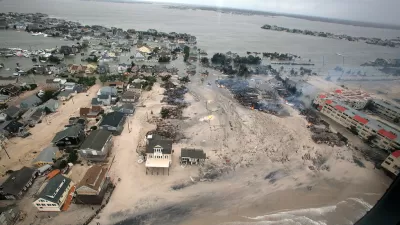In the aftermath of Hurricane Sandy, the news media were fixated on the plight of middle-class homeowners in places like the Rockaways in Queens. But two new reports show that low-income renters were the more prevalent victims of the storm.
Matt Chaban discusses the findings of two new studies released this week - one by the Furman Center for Real Estate and Urban Policy at NYU [PDF], the other by affordable housing developers Enterprise Community Partners [PDF] - that show "Sandy is more likely to have struck a low-income family that rents an apartment than a more well-off one that owns a home."
According to Chaban, the studies "found that of the 150,000 families who have applied for FEMA housing aid, 56% were renters, rather than homeowners. What's more it found that 61% of applicants make less than $60,000 a year, with half that group making less than $15,000 a year."
"'With almost 50% of households making $30,000 a year or less, this is a big deal,' said Shola Olatoye, vice president and New York market leader at Enterprise. 'These are low-income families already in need, and Sandy has made things so much worse.'"
"The authors of the studies hope that their data will help drive the policy debates to come," adds Chaban. "With tens of billions of dollars in federal aid at stake, they believe the money must be spent carefully, and may not even be enough to cover the recovery costs. After all, renters are not typically the ones with the insurance policies, so it can be hard to force a landlord to make repairs."
FULL STORY: Sandy hit the poor hardest in New York

Planetizen Federal Action Tracker
A weekly monitor of how Trump’s orders and actions are impacting planners and planning in America.

Restaurant Patios Were a Pandemic Win — Why Were They so Hard to Keep?
Social distancing requirements and changes in travel patterns prompted cities to pilot new uses for street and sidewalk space. Then it got complicated.

Map: Where Senate Republicans Want to Sell Your Public Lands
For public land advocates, the Senate Republicans’ proposal to sell millions of acres of public land in the West is “the biggest fight of their careers.”

Maui's Vacation Rental Debate Turns Ugly
Verbal attacks, misinformation campaigns and fistfights plague a high-stakes debate to convert thousands of vacation rentals into long-term housing.

San Francisco Suspends Traffic Calming Amidst Record Deaths
Citing “a challenging fiscal landscape,” the city will cease the program on the heels of 42 traffic deaths, including 24 pedestrians.

California Homeless Arrests, Citations Spike After Ruling
An investigation reveals that anti-homeless actions increased up to 500% after Grants Pass v. Johnson — even in cities claiming no policy change.
Urban Design for Planners 1: Software Tools
This six-course series explores essential urban design concepts using open source software and equips planners with the tools they need to participate fully in the urban design process.
Planning for Universal Design
Learn the tools for implementing Universal Design in planning regulations.
Heyer Gruel & Associates PA
JM Goldson LLC
Custer County Colorado
City of Camden Redevelopment Agency
City of Astoria
Transportation Research & Education Center (TREC) at Portland State University
Camden Redevelopment Agency
City of Claremont
Municipality of Princeton (NJ)



























